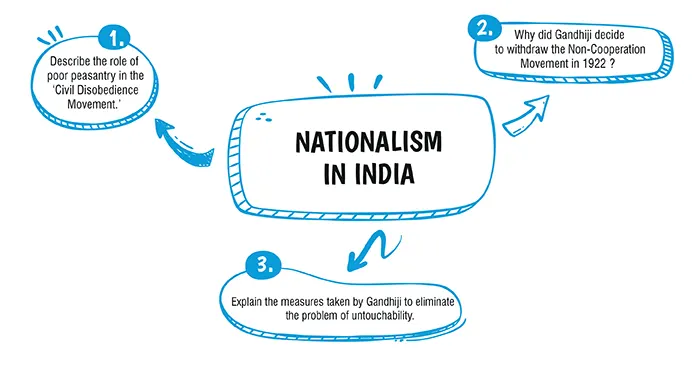Home / Boards / CBSE / Important Questions / Class 10 / Social Science / Nationalism in India
Table of Contents

Ans. (c)
Explanation:
In December 1929, under the Presidency of Jawaharlal Nehru, the Lahore Congress formalised the demand of 'Purna Swaraj' or full independence for India.
Ans. (b)
Explanation:
In the 1870s, an Indian poet named Bankim Chandra Chatterjee wrote the famous 'Vande Mataram'- a hymn to the motherland. In this hymn, he personified India as a mother goddess.
Explanation:
Certain rich peasant communities like the Patidars of Gujarat and the Jats of Uttar Pradesh were active in the movement. For them, the struggle for Swaraj was a struggle against high revenue. The poor peasants also demanded the revenue to be lowered and also wanted the unpaid rent to their landlords to be remitted.
Explanation:
Gandhiji decided to withdraw the Non-Cooperation Movement due to various incidents of violence perpetrated by the masses, especially the Chauri Chaura incident in 1922 where the people clashed with the police, setting a police-station on fire.
Explanation:
Mahatma Gandhi called 'untouchables' as Harijans or “Children of God” and worked for their liberation. He organised satyagrahas to secure the Dalits entry into temples, access to public wells, tanks, roads, and schools. To dignify the work of the sweepers, he himself took up the task of cleaning toilets.
Download Mind Map of this chapter
Download NowWant to Practice Mock Tests of this chapter
Practice NowDownload Important Questions of this chapter
Download Now| Chapter No. | Chapter Name |
|---|---|
| History | |
| Chapter 1 | The Rise of Nationalism in Europe |
| Chapter 2 | Nationalism in India |
| Chapter 3 | The Making of a Global World |
| Chapter 4 | The Age of Industrialization |
| Chapter 5 | Print Culture and the Modern World |
| Geography | |
| Chapter 6 | Resources and Development |
| Chapter 7 | Forest and Wildlife Resources |
| Chapter 8 | Water Resources |
| Chapter 9 | Agriculture |
| Chapter 10 | Minerals and Energy Resources |
| Chapter 11 | Manufacturing Industries |
| Political Science | |
| Chapter 12 | Power – sharing |
| Chapter 13 | Federalism |
| Chapter 14 | Gender, Religion and Caste |
| Chapter 15 | Political Parties |
| Chapter 16 | Outcomes of Democracy |
| Economics | |
| Chapter 17 | Development |
| Chapter 18 | Sectors of the Indian Economy |
| Chapter 19 | Money and Credit |
| Chapter 20 | Globalization and The Indian Economy |
| Chapter Wise Important Questions for CBSE Board Class 10 History |
|---|
| The Rise of Nationalism in Europe |
| Nationalism in India |
| The Making of a Global World |
| The Age of Industrialization |
| Print Culture and the Modern World |
CBSE Important Questions Class 10
ICSE Important Questions Class 10
CBSE Important Questions Class 10
ICSE Important Questions Class 10